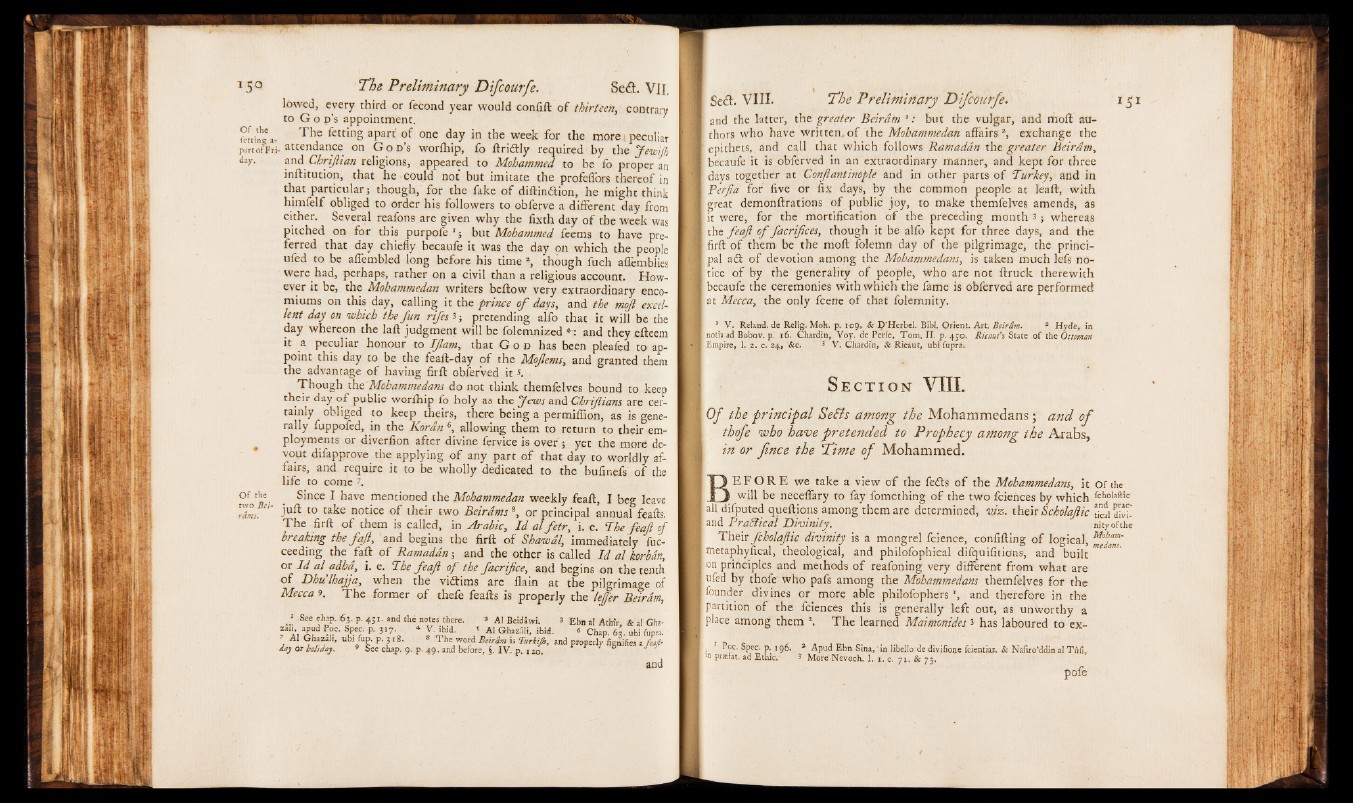
O f the
letting a-
part ofFriday.
O f the
two Beirdm.
The Preliminary Difcourfe. Seét. VII,
lowed, every third or fecond year would confift of thirteen, contrary
to G o p’s appointment. 1
The fetting apart of one day in the week for the morei peculiar
attendance on G o d’s worfhip, Co ftridtly required by the Jewifi
and Cbrißian religions, appeared to Mohammed to be fo proper an
inftitution, that he could not but imitate the profeflors thereof in
that particular; though, for the fake of diftinftion, he might think
himfelf obliged to order his followers to obferve a different day from
either. Several reafons are given why the fixth day of the week was
pitched on for this purpofe 1; but Mohammed feems to have preferred
that day chiefly becaufe it was the day on which the people
ufed to be affembled long before his time % though fuch alfemblies
were had, perhaps, rather on a civil than a religious account. However
it be, the Mohammedan writers bellow very extraordinary encomiums
on this day, calling it the prince of days, and the moß excellent
day on which the fun rifes 3; pretending alfo that it will be the
day whereon the laft judgment will be folemnized and they efleem
it a peculiar honour to Ißam, that G od has been pleafed to appoint
this day to be the feafl-day of the Moßems, and granted them
the advantage of having firft obferved i t s.
Though she. Mohammedans do not think themfelves bound to keep
their day of public worfhip fo holy as the Jews and Chrißians are certainly
obliged to keep theirs, there being a permifiion, as is generally
fuppofed, in the Koran 6, allowing them to return to their employments
or diverfion after divine fervice is over ; yet the moré devout
difapprove the applying o f any part of that day to worldly affairs,
and require it to be wholly dedicated to the bufinefs of the
life to come 7.
Since I have mentioned the Mohammedan weekly feaft, I beg leave
juft to take notice of their two Beirams 8, or principal annual feafls.
The firft o f them is called, in Arabic, Id al fetr, i. e. The feaft of
breaking the fa ß , 'and begins the firft of Shawdl, immediately fuc-
ceeding the faft of Ramadan; and the other is called Id al Urban,
or Id al adhd, i. e. The feaß o f the facriftce, and begins on the tenth
o f Dhu’lhajja, when the vi&ims are flain at the pilgrimage of
Mecca». The former of thefe feafts is properly the lefer Beirdm,
J . See 6j- P- 4 SI - ^ thé notes there. ® Al Beidiwi. 3 Ebn » Atlrir, & al Ghs-
zah, apud Poc. Spec. p. 3.7. * V. ibid. ’ AI G teäK , ibid. 6 chap. 6 ubi |
. Al Ghazali, vbi fup. p. 318. * The word Beirim is Turkifo, and properly figjjifies a fiaflday
or holiday. 9 See chap. 9. p. 49. and before, IV. p. 120. 6 J J
and
Se<S. VIII. The Preliminary Difcourfe. 151
| and the latter, the greater Beirdm ': but the vulgar, and moft au-
i thors who have written,of the Mohammedan affairs2, exchange the
| epithets, and call that which follows Ramadan she greater Beirdm,
I becaufe it is obferved in an extraordinary manner, and kept for three
days together at Conftantinople and in other parts of Turkey, and in
Ferfia for five or fix days, by the common people at leaft, with
great demonftrations of public joy, to make themfelves amends, as
it were, for the mortification of the preceding month 3; whereas
the feaft of facriftces, though it be alfo kept for three days, and the
firft of them be the moft folemn day of the pilgrimage, the principal
adl of devotion among the Mohammedans, is taken much lefs no-
i tice of by the generality of people, who are not ftruck therewith
becaufe the ceremonies with which the fame is obferved are performed
at Mecca, the only fcene of that folemnity.
1 V. Reland, de Relig. Moh. p. 109, & D’Herbel. Bibl. Orient. Art. Beirdm. 2 Hyde, in
‘nods ad Bobov, p: 16. Chardin, Voy. de Perfe, Tom. II. p. 450. Ricaufs State of the Ottoman
Empire, 1. 2. c. 24, &c. 3 V. Chardin, & Ricaut, ubifupra.
S e c t i o n VIII.
Of the principal Setts among the Mohammedans; and o f
thofe who have pretended to Prophecy among the Arabs,
in or fince the Time of Mohammed.
BE F O R E we take a view of the fedts o f the Mohammedans, it O f the
will be neceflary to fay fomething of the two fciences by which
jail difputed queftions among them are determined, viz. their Scholaftic ti«l diJi-
and Practical Divinity. nityofthe
Their fcholaftic divinity is a mongrel fcience, confifting o f logical,
nietaphyfical, theological, and philofophieal difquifitions, and built **
on principles and methods of reafoning very different from what are
ufed by thofe' who pafs among the Mohammedans themfelves for the
founder divines or more able philofophers ’, and therefore in the
partition of the fciences this is generally left out, as unWorthy a
place among them \ The learned Maimonides 3 has laboured to ex-
’ Poc. Spec. p. 196. 1 Apud Ebn Sina, in libello de divifiooe fcientiai. & Nafiro’ddin a) Tub,
10 prsefat. ad Ethic.' 3 More Nevoch, 1. i. c. 71. & 73.